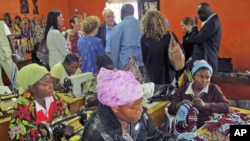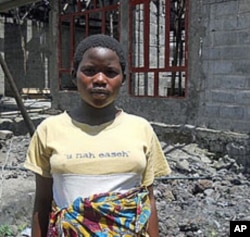United Nations officials have called the Democratic Republic of Congo "the rape capital of the world" and railed against the atmosphere of impunity that allows soldiers and civilians to rape women and children without fear of arrest. This year, several soldiers have been convicted of rape in Congo, including a prominent colonel, offering a glimmer of hope for victims. But Congolese doctors say rape is still a weapon in the simmering conflict in eastern Congo, that is often unreported, and hardly ever prosecuted.
Last summer a soldier living in her house told Amina to make him a fire before he raped her. She is now 13, and her baby is due in May.
Amina says the rapist told her not to tell anyone and threatened to shoot her. She said she kept silent until her parents noticed she was pregnant. She is too young to have a baby, Amina said, and also that people are laughing at her.
The man who raped her, she said, was arrested, tried and will be sentenced to jail. The Congolese man sitting next to her said he doubts that will ever happen. He thinks her rapist probably will go free.
Challenging impunity
Doctor Ange Rose Valimamdi, the supervisor for the sexual violence program at Caritas in Goma, one of the region’s many aid organizations, said rape victims in eastern Congo are everywhere. Often, it is a weapon of war, used to terrorize the population and force villagers from their homes. But just as frequently, she said, it is random acts of violence committed by soldiers and civilians who feel they have nothing to fear from the law.
Valimamdi said less than 10 percent of rape cases in Congo that go to court end up with a conviction, and the vast majority are never even reported. Aid organizations usually have the capacity to provide emergency care to women who come forward, she said, but they have no way to stop the rapes. Some villages in the region are attacked by militias over and over again. Women, children, and even sometimes men are raped and homes are looted. Just last week, she said, armed soldiers not far from Goma raped seven women. Like many rural women, they were surrounded by soldiers and attacked while working in the fields.
Valimamdi said recent figures compiled by aid agencies suggest a 25 percent increase in the number of rapes in her province of North Kivu in 2010. The increase could be skewed, she adds, cautioning that it also might indicate an increase in the number of reports.
Commonplace crime
But she said mass rapes - like the New Year’s day attack on the village of Fizi, where at least 62 women were raped - are still commonplace in eastern Congo, despite the recent conviction of 12 soldiers.
An army colonel was sentenced to 20 years in prison for the Fizi attack. Last month, 11 other soldiers were found guilty of rape, pillaging, destroying schools, and kidnapping, in a landmark case hailed by the U.N. as a move towards justice.
Valimamdi says convictions of rapists remain very rare, however, even if they offer some hope for a solution to what seems to be an insurmountable problem. In North Kivu alone, she said, she knows of two villages that often are attacked by local militias.
Displaced survivors
Jennifer Melton, a child protection specialist for UNICEF, said the agency assisted 16,000 rape survivors in Congo in 2010, including women, men, girls and boys. About half were children, raped by militias or civilians, sometimes even in schools. Melton said that in some parts of Congo, rape is a part of the conflict.
But in other areas, she said, when soldiers commit rape, it is not meant to be a weapon. It is simply a part of the culture of conflict that has grown up over decades of instability, and a war that claimed about 5.5 million lives between 1998 and 2008. Technically, the war ended in 2003, but locals say the fighting never really stopped.
"They’re going through a village and the whole attitude of rape and pillage - that is a benefit of kind of being a soldier with a gun and with a uniform," said Melton.
Breaking a bitter cycle
Melton said even when rape is not a specific war tactic, it contributes to the endless cycle of poverty and displacement that feeds the conflict. The U.N. refugee agency says more than 2 million people have fled their homes in recent years, and are living in camps, or crowding into cities or other villages.
In a hospital in Goma, 40-year-old Chantal said her village, Fumandu, is abandoned. Militiamen have burned their homes, and raped most of the women over the course of multiple attacks.
Chantal said last October she was raped by three soldiers. She said nothing at first, but then got sick, and sought medical treatment. When she recovers, though, she said she cannot go home.






